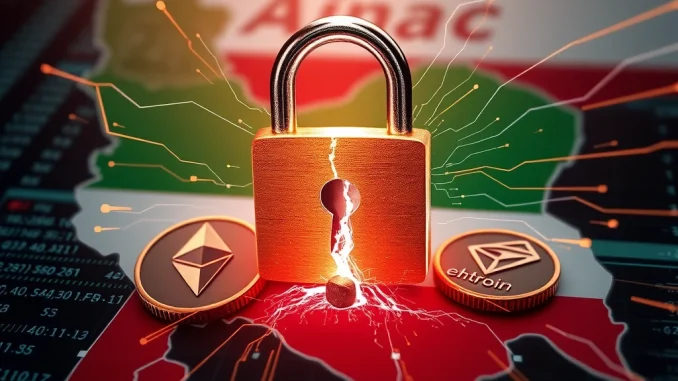
The cryptocurrency world is once again grappling with unsettling news as Iran’s largest crypto exchange, Nobitex, has reportedly fallen victim to a significant security breach. This event, now being widely referred to as the Nobitex hack, highlights the persistent security challenges faced by centralized platforms in the digital asset space.
What Happened in the Nobitex Hack?
Reports emerged recently regarding a major security incident impacting Nobitex. According to blockchain security firm SlowMist, who reported the event on X (formerly Twitter), the breach targeted Nobitex’s hot wallets and parts of its internal infrastructure. Hot wallets, being connected to the internet, are inherently more vulnerable than cold storage, though essential for facilitating user withdrawals and trading.
Initial analysis suggests a substantial amount of digital assets were compromised during this Nobitex hack. While official figures from the exchange are awaited, on-chain analyst ZachXBT, known for tracking illicit crypto flows, estimated the total losses at around $81.7 million.
How Was the $81.7M Loss Spread Across Networks?
The estimated $81.7M loss wasn’t confined to a single blockchain. The attackers seemingly managed to compromise funds held across multiple networks. ZachXBT’s analysis indicated that the stolen assets included holdings on the TRON (TRX), Ethereum Virtual Machine (EVM) compatible chains (like Ethereum itself or potentially others), and the Bitcoin (BTC) networks.
This multi-chain impact underscores the complexity of securing funds held across various blockchain ecosystems within a single exchange infrastructure. It suggests the attackers potentially exploited vulnerabilities that granted access to private keys or internal systems managing assets on different chains.
Who Claimed Responsibility for This Crypto Exchange Hack?
Adding another layer to this incident, the cyberattack has reportedly been claimed by a hacker group identifying themselves as Gonjeshke Darande. This claim, if verified, points towards a potentially organized effort behind the breach.
A crypto exchange hack of this magnitude involving a claiming group raises concerns about the evolving tactics of malicious actors in the digital asset landscape. It prompts questions about the motivations behind the attack and the specific vulnerabilities exploited.
What Does This Breach Mean for Blockchain Security and Iran Crypto?
The Nobitex hack serves as a stark reminder of the ongoing threats to centralized cryptocurrency exchanges globally. Regardless of geographical location or operational scale, exchanges remain prime targets for cybercriminals seeking to exploit digital assets.
For the broader discussion on blockchain security, this event emphasizes the critical need for robust security protocols, including:
- Implementing strong multi-factor authentication
- Regular security audits and penetration testing
- Segmenting networks and restricting access to critical systems
- Utilizing cold storage for the vast majority of user funds
- Having a comprehensive incident response plan
In the context of Iran crypto, where the regulatory environment can be complex, this incident could potentially impact user trust and regulatory perceptions of digital asset platforms within the country. It highlights the need for exchanges operating in such environments to prioritize security measures rigorously to protect their users.
In Summary
The reported Nobitex hack, resulting in an estimated $81.7M loss across Bitcoin, EVM, and TRON networks, is a significant event for the cryptocurrency community, particularly impacting Iran crypto users. The claim of responsibility by Gonjeshke Darande adds a concerning dimension. This incident reinforces the urgent need for enhanced blockchain security practices across all centralized platforms to prevent future crypto exchange hack events and protect user assets.



